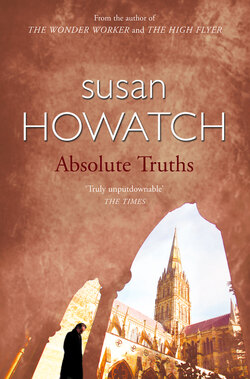Читать книгу Absolute Truths - Susan Howatch - Страница 23
III
ОглавлениеWhen I had visited Starbridge in 1937, the year I had met and married Lyle, I had thought it more than lived up to its reputation of being the most beautiful city west of the Avon. In my mind’s eye I could still see it shining in the hot sunlight of that distant summer; I could remember how enchanted I had been by its medieval streets, flower-filled parks and winding, sparkling river, how mesmerised I had been by the Cathedral, towering above the walled Close on a mound above the shimmering water-meadows. ‘Radiant, ravishing Starbridge!’ I had exclaimed to myself more than once during that crucial time, but that was all long ago, and Starbridge was not the city it had been before the war.
Why must unspoilt county towns inevitably change for the worse? Those Starbridge parks remained flower-filled in summer but now they were litter-strewn as the result of the huge increase in tourists and the slovenly habits of the young. Most of the medieval streets still existed but a number of them south of Mitre Street had been bulldozed to make way for a hideous invention, a ‘multistorey car park’ which was attached to something called a ‘shopping centre’. This new development was so ugly that I felt hot with rage whenever I saw it. Fortunately the mayor who had encouraged this act of vandalism had dropped dead so I was no longer obliged to be polite to him, but the city council members lingered on, a sore trial to my Christian patience. More concrete horrors were rising on the outskirts of the city where a by-pass (on stilts!) was being constructed, but this innovation I was prepared to tolerate since its purpose was to eliminate the city’s traffic jams.
The Starbridge General Hospital, a Victorian building, was unchanged on the outside despite being constantly modernised within. It stood near Eternity Street on the river which flowed swiftly, fed by two tributaries, through the heart of the city. As I arrived that afternoon the rain was hardening into sleet and a bitter north wind was blowing. From the car park the tower of St Martin’s-in-Cripplegate, my archdeacon’s church, could be seen standing palely, as if numbed with cold, against a yellowish, snow-laden sky.
For a moment I thought of those radiant sunlit days of 1937, and suddenly I heard a much younger Lyle say in my memory: ‘I’m Miss Christie, Mrs Jardine’s companion …’ I hurried into the hospital but the memories pursued me and I heard Bishop Jardine himself exclaim: ‘Welcome to Starbridge!’ as he made a grand entrance into his drawing-room. It occurred to me then that I was on the brink of remembering Loretta, but that was one episode from 1937 which I always willed myself not to recall, particularly since I had become a bishop. Blocking it at once from my mind I entered the hospital’s main hall.
A dreary interval ensued. I asked for Desmond but was told he was in the operating theatre. I asked for the chaplain but was told he was not in his office. I asked for the hospital almoner and/or the doctor in charge of the case, but was told to take a seat. Evidently I was becoming tiresome and needed to be disciplined.
Since I was not wearing my formal uniform of frock-coat and gaiters, and since my overcoat hid my purple stock and pectoral cross, I was not immediately recognisable as a VIP. I did toy with the idea of opening my coat and flashing my chest at the lacklustre receptionist, but I thought better of it. No degree of impatience can excuse vulgarity.
I managed to kill my annoyance by telling myself the woman was probably worn out by long hours and low pay, and having thus transformed myself from a cross old buffer to a charitably inclined bishop (a process which I found more than usually exhausting), I received my reward: the almoner arrived to look after me, and I was taken speedily down a chain of cream-coloured corridors to meet the doctor in authority. The almoner even called me ‘my lord’. For one golden moment I could imagine we were both back in those sunlit days before the war.
My spirits rose even further when the doctor told me that although the injuries were unpleasant, Desmond’s life was not in danger. A series of heavy kicks had cracked a couple of ribs; a series of heavy punches had battered his face, which was now being stitched up; the main problem was the shock sustained, and Desmond would need to be in hospital for at least forty-eight hours, possibly longer, while his progress was monitored. Since he was an elderly man, not robust, a period of convalescence would be advisable once he left the hospital. Meanwhile he could be allowed no visitors until the following morning.
Having thanked the doctor for all this information I was taken by the almoner to her office in order to deal with certain bureaucratic formalities relating to the admission. She did try to contact the chaplain on the internal telephone and when there was still no reply from his office she arranged for a message to be broadcast on the public address system, but he appeared to have vanished. Not wishing to delay the almoner further I said I would wait for him in the main hall, but this decision proved to be a mistake. No chaplain appeared, despite yet another summons on the public address system, but two cold-eyed men in raincoats entered the building and immediately collared me.
With dismay I found myself in the hands of the police and confronting the possibility of scandal.
